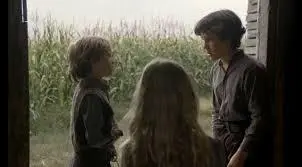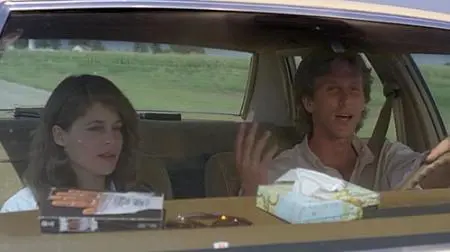Welcome back to What Works & What Doesn't, where we analyze screenplays based, literally, on what works and what doesn't work. This time around we'll be discussing the use of voice-over narration via the 1984 film Children of the Corn, based upon a short story of the same name by Stephen King (first published in 1977, and featured in his 1978 collection Night Shift).
If you don't remember any voice-over dialogue from this movie, it's okay: I didn't either until one rainy, lazy day several weeks ago, when I wanted a dumb, gory horror movie during which I could shut off my brain and relax for a while, and selected Children of the Corn as the perfect bucket of nutrition-less candy on which to feast. I hadn't seen it since I was a teenager, so when the "gee-whiz" voice of Job—the plucky youngster who, alongside his sister Sarah, dissent from the goings-on of the kid cult—I had to stop the film and double check that this wasn't some alternate cut. But no, that voice-over dialogue at the beginning of the film had always been there, and as I continued watching, it became painfully obvious why I'd forgotten all about it, as you will see as we dive into our analysis of the screenwriting...
(Hint: it's because the dialogue is shitty.)
Voice-Over Narration Defined
As we've done in the past, let's turn to Robert McKee and his book on the craft, Story, for a clear definition of quality voice-over dialogue—though, really, this is less a definition, more a rule of thumb, which I could not agree with more. McKee writes:
The test of narration is this: Ask yourself, 'If I were to strip the voice-over out of my screenplay, would the story still be well told?' If the answer is yes...keep it in. Generally, the principle 'Less is more' applies: the more economical the technique, the more impact it has. Therefore, anything that can be cut should be cut.
McKee goes on to say that the only good reason to use voice-over is counterpoint—a means of commenting upon or even subverting what we see on the screen. He mentions Woody Allen as a master of counterpoint narration, but for my money the finest use of this technique appears in Fight Club (a discussion for another time).
What Works & What Doesn't
The exact opposite, however, appears in Children of the Corn. Take, for instance, the very first scene in the film:
The narration starts at the 0:58 minute mark. Job explains that he's the only kid who went to church that day because all the others had gone to the fields with Isaac, the leader of the kid cult, later revealed to be a traveling boy preacher who captivated the younguns of Gatlin with his radical interpretations of the Old Testament. He was not allowed to go because his dad didn't like Isaac. "He was pretty smart, my dad," Job states.
So, the voice-over dialogue here isn't too egregious. The boy gives us information we're not directly seeing on screen. The dialogue also offers a bit of foreshadowing in the "pretty smart" line, letting us know that Isaac is a bad kid. The problem, of course, is that we'll learn all the information he provides later in the scene, when the Children of the Corn slaughter all the adults in Hansen's Diner. Thus, this child telling us these details at this point in the narrative only dwindles the impact of the gruesome massacre to follow. It seems that, rather than allow the narrative to tell itself, screenwriter George Goldsmith (or, more likely, the film's producers) were afraid the audience would lose interest, and so they're attempting to anchor us with this innocent guidance.
But again, while essentially pointless, it isn't yet breaking the cardinal rule of voice-over as defined by McKee.
That all changes in the next few seconds, however, when Job tells us he and his father go to Hansen's as we watch the boy and the man walk into the restaurant. He then explains that Sarah came down with "the fever," that his dad was worried, and that his dad wanted to call home to check on her. Immediately following this, the dad proclaims the exact same details in somewhat expository dialogue. Why have the little boy explain this, when we can clearly see the action unfolding in front of our eyes?
We next see Malachi and the others acting "real creepy." Job tells us as such, and basically proceeds to narrate the entire scene, reiterating every thing we see for ourselves.
Again, why? What is the motivation for explaining all this to us?
The idea that the audience might be confused by the proceedings on screen seems like the likeliest reason why, given the additional voice over dialogue in the next scene involving Job. I couldn't find a clip to include, but Job states, "We weren't the only ones who thought Isaac was weird. One day, Joseph told us he was running away..." He says this as we watch a boy with a suitcase clearly running in secret between some barns, Job and Sarah right behind him.
This trend continues again later, as Job and Sarah play in their old house:
And after this scene, the voice-over dialogue disappears entirely, with the filmmakers no doubt figuring that, by this point in the narrative, the audience should be up to speed on the children's weird belief system—this despite the fact the voice-over dialogue never really gets into the nuances of their belief system in the first place, instead simply telling us snippets of detail about Isaac and Malachi's "weirdness," then otherwise simply narrating things we can see on the screen.
In short, we don't need this voice-over dialogue at all. You could completely remove it, as McKee suggests, and the narrative would not suffer one bit (another factor suggesting it was added after the fact).
But maybe the worst part of this voice-over isn't that it's effectively pointless, nor because it is abandoned less than midway through the film after it apparently "serves its purpose"; no, the worst part about it is that it is misleading. It makes us think the kids will be the focal points of the narrative, and not the godawful adults in the film, Burt and Vicky (Peter Horton and Linda Hamilton, respectively). Burt is a total asshole, and Vicky divides her time between nagging Burt to make a commitment to her and completely submitting to everything he says. She follows every command he barks at her, and generally eats every lump of shit he flings. Burt finally says "I love you" to her, and it's a "happy" ending, but do we really care? Nope. That's why everyone remembers Isaac and Malachi—they're the real stars of this film, and it's a shame we have to sit through so much of these annoying, thoroughly unlikable grown-ups.
I should of course note that Burt and Vicky are the focus of King's original story, and while they are unlikable there as well, King provides a backstory for the characters that adequately explains their awfulness. For one, they are an older married couple who have hit the road on vacation, in the hopes of salvaging their marriage. Burt is a Vietnam vet, whose brusqueness and cruel treatment of Vicky comes from (but is not justified by) his Army background. Vicky, for her part, fights Burt in the only way she knows how, with cutting remarks and sarcasm, which Burt returns tenfold. This causes the couple to constantly bicker, which leads to them hitting the corn follower in the road (just as they do in the film). King's story also has a much bleaker ending than the film, with Vicky actually dying at the hands of Isaac and his followers, while Burt is killed by "He Who Walks Behind the Rows," the vicious deity they worship, which is later revealed in King's The Stand to be Randall Flagg. It is ultimately the disintegration of this couple's marriage (and perhaps even the notion that they never much loved each other to begin with, given that they were high school sweethearts) that brings Burt and Vicky to their grim demises. Moreover, it is Burt's bullheaded stubbornness that gets them into their predicament to begin with, his inability to actually listen to his wife and compromise with her.
Thus, we're not exactly rooting for Burt and Vicky's deaths, but when they meet their ends, it makes sense within the context of the narrative. And yet, the film treats these characters as heroic, giving them a happy ending (they destroy He Who Walks Behind the Rows with fire and sort-of adopt Job and Sarah, walking away from terror toward familial bliss), despite the fact they are far more unlikable then their literary counterparts. In this way, it is kind of a bummer they don't meet the same fates as King's Burt and Vicky.
But really, it's all Burt. Vicky's backstory, whether by King or Goldsmith, is kinda sad, whereas Burt, even with King's more sensible explanation of his jerkery, is still, at the end of a day, a rank, fucking jerk. That he "saves the day" in the film makes his behavior all the more galling. Let him get eaten up by He Who Walks Behind the Rows, allowing Vicky to save the day Sarah Connor-style, realizing her own self-worth and bad-ass status apart from her smug, domineering boyfriend.
Conclusion
As you can see, the voice-over narration at the beginning of the film is really the least of Children of the Corn's problems. All things considered, this is a bad movie—but, it remains an enjoyable bad movie, with plenty of quotable moments ("Outlander! We have your woman, outlander!") and memorable scenes (Isaac's death and resurrection near the end is probably the best part of the whole film). But in addition to its entertainment value and unintentional humor, all would-be screenwriters can learn a lot from Children of the Corn, because it is rife with "what not to do" mistakes. Even if you can't turn your brain off and enjoy the film for what it is—a dumb, gory horror movie—give it watch to better hone your craft.
What's your take on Children of the Corn? I'm not convinced anyone will actually argue it is a "quality" film, but by all means prove me wrong. Do you find it deeply flawed but enjoyable to watch regardless, as I do? Or is so bad it's not even worth studying from a "what not to do" standpoint? Let us know what you think in the comments section below.

About the author
Christopher Shultz writes plays and fiction. His works have appeared at The Inkwell Theatre's Playwrights' Night, and in Pseudopod, Unnerving Magazine, Apex Magazine, freeze frame flash fiction and Grievous Angel, among other places. He has also contributed columns on books and film at LitReactor, The Cinematropolis, and Tor.com. Christopher currently lives in Oklahoma City. More info at christophershultz.com












